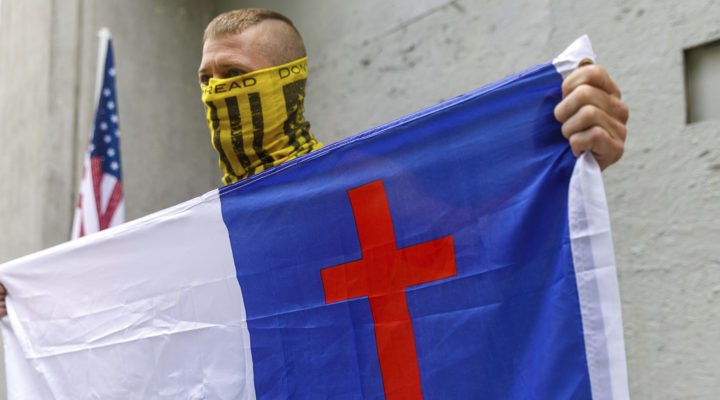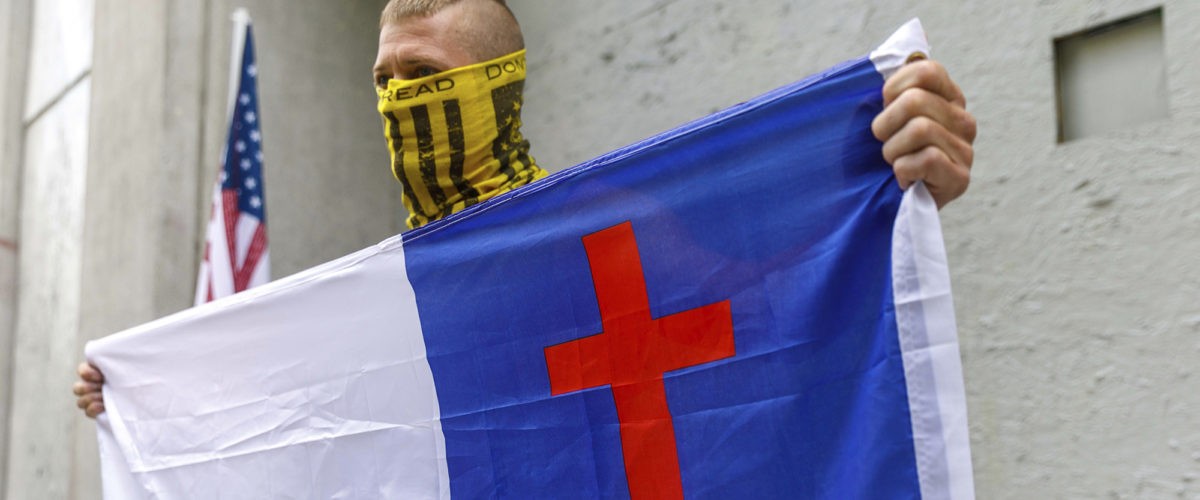The notion cherished by Christian nationalists that the United States enjoys divine favor is not shared by most Americans, according to new research from Public Religion Research Institute.
Among a myriad of topics covered by PRRI’s 12th annual American Values Survey, pollsters asked more than 2,500 respondents if they believe the that “God has granted America a special role in human history.”
“In 2013, nearly two-thirds of Americans (64%) agreed with this statement, compared to only 29% who disagreed. Today, belief in this statement has dropped a massive 20 percentage points, to 44%, with a majority of Americans (53%) now disagreeing that God has granted America a special role in human history,” according to the survey released in partnership with the Brookings Institution.
The research covered a wide range of social, religious and political issues, including American views on the value of religious and racial diversity and attitudes about the nation’s declining white population.
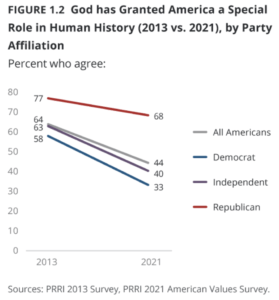 On the question of whether the U.S. enjoys a special divine purpose, this year’s survey found that 68% of Republicans believe it does, compared to 33% of Democrats and 40% of independents.
On the question of whether the U.S. enjoys a special divine purpose, this year’s survey found that 68% of Republicans believe it does, compared to 33% of Democrats and 40% of independents.
“Notably, belief in this statement has dropped across all partisan groups since 2013, including 25 percentage points among Democrats (from 58% to 33%), 23 percentage points among independents (from 63% to 40%), and nine percentage points among Republicans (from 77% to 68%).”
White evangelical Protestants (75%) are the most likely to believe America carries special favor with God, but even that percentage represents a significant decline from 84% in 2018.
Among other religious groups, belief in America’s divine favor is held by 67% of Black Protestants, 50% of Hispanic Catholics and by 46% of both white mainline Protestants and white Catholics.
PRRI found Americans more divided when responding to statements about religious diversity.
Nationally, about 38% said they prefer a religiously diverse population, compared to 24% who want the nation to consist mostly of Christians and 38% who described themselves somewhere in between.
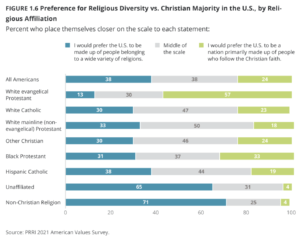 “There are deep divides along partisan and religious lines in preferences for religious diversity. Only 17% of Republicans, compared to 41% of independents and 55% of Democrats, mostly prefer the U.S. to be made up of people belonging to a wide variety of religions,” according to the survey report. “Four in 10 Republicans (38%), compared to 20% of independents and 14% of Democrats, prefer the U.S. to be a nation primarily made up of people who follow the Christian faith.”
“There are deep divides along partisan and religious lines in preferences for religious diversity. Only 17% of Republicans, compared to 41% of independents and 55% of Democrats, mostly prefer the U.S. to be made up of people belonging to a wide variety of religions,” according to the survey report. “Four in 10 Republicans (38%), compared to 20% of independents and 14% of Democrats, prefer the U.S. to be a nation primarily made up of people who follow the Christian faith.”
Christians, however, mostly hold a dim view of religious diversity, according to the survey.
“Less than four in 10 Hispanic Catholics (38%), one-third of white mainline (non-evangelical) Protestants (33%), and about three in 10 Black Protestants (31%), white Catholics (30%) and other Christians (30%) express a preference for religious diversity.
White evangelical Protestants (13%) stand out as the least likely group to express a preference for religious diversity,” the survey found. “Indeed, white evangelical Protestants are the only religious group in which a majority (57%) express a preference for a mostly Christian country.”
Non-Christian religious Americans and the religiously unaffiliated, at 71% and 65% respectively, were the only major faith groups to favor religious diversity.
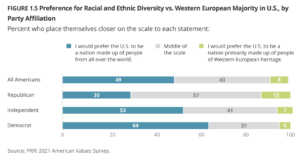 The survey also captured differing views about racial diversity among Americans, with about half mostly agreeing that the U.S. should be a nation of people from all over the world, and 8% preferring that the population consist of citizens of Western European heritage. Another 43% expressed opinions somewhere in the middle of those two options.
The survey also captured differing views about racial diversity among Americans, with about half mostly agreeing that the U.S. should be a nation of people from all over the world, and 8% preferring that the population consist of citizens of Western European heritage. Another 43% expressed opinions somewhere in the middle of those two options.
Among Republicans, 30% said they prefer more global diversity in the U.S. population, compared to 53% of independents and 64% of Democrats.
“Republicans (57%) are more likely than independents (41%) and Democrats (31%) to place themselves in the middle of the scale,” the report explains. “Thirteen percent of Republicans mostly agree they would prefer a country of mostly Western European heritage (13%), compared to 7% of independents and 5% of Democrats.”
Yet a majority of Americans (59%) agreed that the 2020 U.S. Census finding that the nation’s white population declined 8.6% since 2010 “doesn’t matter.” Another 23% of U.S. adults, and 39% of Democrats, described that news as mostly positive, while 17% saw it as mostly negative.
“Republicans, by contrast, are more than five times less likely to say this change is positive vs. negative (6% vs. 33%),” PRRI reported. “Independents are nearly twice as likely to say this change is positive vs. negative (23% vs. 13%).”
Only 16% of white Americans said the change is mostly positive, compared to 38% of Black and 34% of Hispanic Americans.
Related articles:
Most Americans favor church-state separation, but many evangelicals do not
Survey paints scary, hopeful picture of U.S. political divide
How American exceptionalism is killing America | Opinion by Richard T. Hughes

